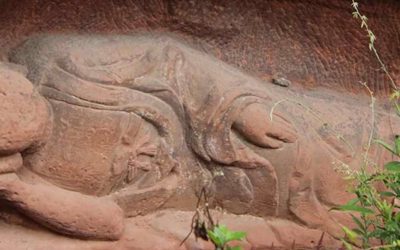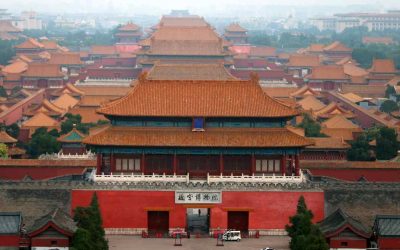The Landing Yao Ancestral Festival of July
All around China, the seventh month of the lunar calendar is known as the month of the ghosts, because in this month is celebrated the Mid-Year Festival. The Mid-Year Festival has nowadays many variations and it includes a complex variety of celebrations, varying with the religious beliefs and the regions of China. It is mainly a folk ghost festival, which the Taoists celebrate praying for their deceased relatives, and the Buddhist, which call it Yulanpen Festival, making offerings to the monks to pray for their deceased relatives on behalf of them.
Among the Yao, this is also a very important festival. This ancestor worship festival is a family ceremony, celebrated only by the people who belong to the same family.
On the 14th day of the 7th month, zongzi, glutinous cakes wrapped in banana leaves, are cooked and sacrificed to the King Pan, their main tribal ancestor, the gods of heaven and earth and the ancestors of the family.
Before the festival
Before the festival, the Yao women start to split bamboo strips. They can cut the bamboo strips only 0.5 cm wide, but more than 2 meters long. These strips will be used to wrap the zongzi. The next thing is to prepare a special kind of charcoal from a local tree, which will be used to coloring the rice. Then they pound the rice.
To make the glutinous rice, they first pound the charcoal with a stone pestle, and then they mix the rice with the charcoal, in this way the rice will be dyed black. Later they add some strips of local bacon, about two fingers thick and a palm-length, and banana leaves smoked over the fire, wrapping with the leaves the rice and the bacon into a large zongzi. At the end, they tie them with bamboo strips and soak them in water overnight.
The Festival day
On the 14th of the seventh month, every family must sacrifice a chicken, a fish and put ready roasted pork leg and bacon to enjoy a sumptuous meal. The zongzi soaked overnight is cooked about 5 hours early in the morning, a process considered auspicious for the Yao.
This day is the most expected moment of the festival, when the people compete for have the services of a Taoist master. Therefore the Taoist masters of the village are in high demand, as every household must sacrifice to the gods, performing a ritual that includes reading their sacred scriptures for about two hours. So, the families that don’t have a close relationship to a Taoist master, must get up very early to enroll the services of one, in the first hours of the morning. If not, it is possible that they need to wait until the afternoon as the ancient regulations estipulate that nobody can at food before finish the ceremony.
During the ceremony offerings to gods and ancestor are presented on a table. Among the sacrificial items they usually have pork meat, chicken and chicken’s parts, as their gall bladder, head, claws, eggs, etc, as well as the dyed black rice zongzi. This is because they think that the family was first living in the yin (dark) house, and they are afraid that, using rice of other colors, the dead relatives will not recognize them. On the other side, as they believe that this day the doors of hell are open and deceased spirits are free to roam in the earth, they are afraid that some unwelcomed guest could arrive attracted by the beautiful colored rice. So the dyed black rice is useful to avoid it being robbed by wild ghosts.
Last posts
Buddhist Immersion from Shanghai: No Need to Board a Plane—Paradise Is Right at Your Doorstep
Buddhist Immersion from Shanghai: No Need to Board a Plane—Paradise Is Right at Your Doorstep Residents of Shanghai eager to learn more about Buddhist art and history often think they must undertake long journeys to reach the sacred mountains of this religion. What...
The Lost Mythology of Ancient China
The Lost Mythology of Ancient China Reconstructing the mythology of ancient China is a painstaking task that tries to characterize some legendary figures and situations based only on the few sentences about them found in later works by philosophers and historians. The...
How a Eunuch Was Created in 19th-Century China
How a Eunuch Was Created in 19th-Century China A wealthy eunuch would purchase a boy from a poor family. This boy had to be between seven and ten years old. He would be kept confined for two weeks and subjected to a very strict diet; he ate little. Use of...







